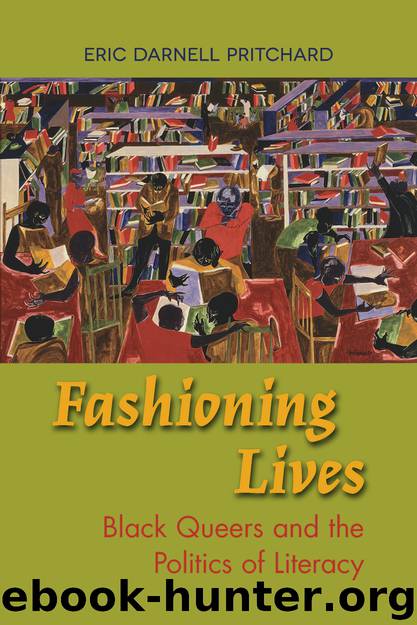Fashioning Lives by Pritchard Eric Darnell;

Author:Pritchard, Eric Darnell;
Language: eng
Format: epub
Publisher: Southern Illinois University Press
While Mosley describes that she did not have to feel afraid after this experience, I want to note that violence against transgender people is still frequent and that fighting back is its own risk and not a cure-all. For example, the activist CeCe McDonald, a Black transgender woman, was sentenced to forty-one months in prison for second-degree manslaughter after stabbing in self-defense a man who hit McDonald in the face with a glass bottle as he and his group of friends exited a bar, shouting racist and transphobic epithets at McDonald. Recognizing that her case was not proceeding well, McDonald took a plea deal rather than face twenty years in prison. Essentially then, as activists noted in the movement to free CeCe, McDonald’s crime was simply saving her own life. The racist, transphobic, and cisnormative violence against McDonald continued when she was jailed in two separate men’s prisons though she is a transgender woman, a violence that many transgender people experience at the hands of the criminal justice system and the state. In Mosley’s description of her own experiences of violence, literacy is again at work in how Mosley applies her reading of Charlie’s life in order to fashion herself. She says that Charlie inspires her to be a more “self-assured” woman in a number of ways, by gaining, among other things, confidence, strength, and resistance. Here Mosley is authoring a new self, one that projects the pride Charlie already possessed and one Mosley felt she could or had to emulate in the face of physical and psychological violence. When Mosley describes part of her resistance as “letting them have it verbally,” Mosley invokes images of using literacy to, as bell hooks might say, “talk back,”46 as opposed to her previous persistent silence. While I emphasize Mosley’s reading here, note that Mosley’s decision to talk back through writing emerges as well, and this is shown in chapter four. But with reading, Mosley’s ability to read Charlie’s life example also highlights those aspects of her history in which she recalls strategies of survival and resistance to violence that her own family members had taught her but that she did not know how to apply. Although these lessons had always been within her, seeing another Black transgender woman publicly fight back empowers Mosley to employ those lessons.
This phenomenon of reading elders and fashioning a self appears in the stories of a number of other research participants, including Steven Morgan, a Black transgender man. Morgan was born in 1985 and resides in a small city in the Midwest near where he was born and raised. Morgan recalled an elder whom he drew from in shaping himself as a transgender man. As a youth, Morgan wrestled with his sexual and gender identity, feeling that he was a lesbian. When he told his parents this, his mother immediately rejected what he was saying. His father was more supportive, but would initially only support him if Morgan’s gender expression were more normatively feminine. “The first thing [my dad] said to me was, ‘Don’t be one of those butch dykes.
Download
This site does not store any files on its server. We only index and link to content provided by other sites. Please contact the content providers to delete copyright contents if any and email us, we'll remove relevant links or contents immediately.
| African-American Studies | Asian American Studies |
| Disabled | Ethnic Studies |
| Hispanic American Studies | LGBT |
| Minority Studies | Native American Studies |
Cecilia; Or, Memoirs of an Heiress — Volume 1 by Fanny Burney(32064)
Cecilia; Or, Memoirs of an Heiress — Volume 3 by Fanny Burney(31460)
Cecilia; Or, Memoirs of an Heiress — Volume 2 by Fanny Burney(31410)
The Great Music City by Andrea Baker(30784)
We're Going to Need More Wine by Gabrielle Union(18637)
All the Missing Girls by Megan Miranda(14752)
Pimp by Iceberg Slim(13783)
Bombshells: Glamour Girls of a Lifetime by Sullivan Steve(13689)
Fifty Shades Freed by E L James(12918)
Talking to Strangers by Malcolm Gladwell(12883)
Norse Mythology by Gaiman Neil(12840)
For the Love of Europe by Rick Steves(11541)
Crazy Rich Asians by Kevin Kwan(8892)
Mindhunter: Inside the FBI's Elite Serial Crime Unit by John E. Douglas & Mark Olshaker(8707)
The Lost Art of Listening by Michael P. Nichols(7165)
Enlightenment Now: The Case for Reason, Science, Humanism, and Progress by Steven Pinker(6877)
The Four Agreements by Don Miguel Ruiz(6322)
Bad Blood by John Carreyrou(6281)
Weapons of Math Destruction by Cathy O'Neil(5837)
